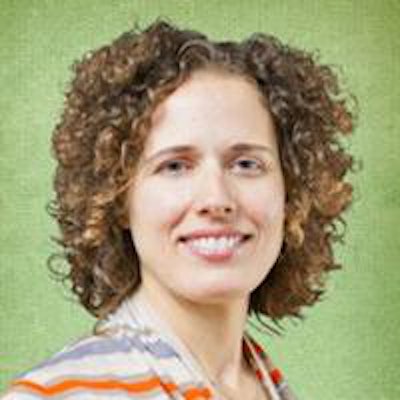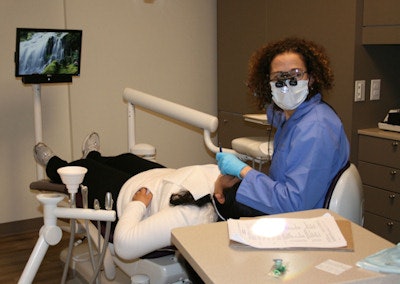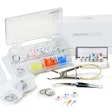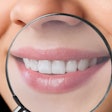
Although not as well known as her celebrity chef husband, Iron Chef-restaurateur Jose Garces, Philadelphia dentist Beatriz Mirabal Garces, DMD, is quietly making her own mark as a dentist committed to providing oral care for poor immigrants through the Garces Family Foundation.
At the foundation's inaugural gala last fall, more than $100,000 was raised to support its programs and to fund grants to Puentes de Salud, a nonprofit organization that provides medical and dental services to Hispanic immigrants. Dr. Garces is also a member of the group's board of directors.
Born in Havana, Dr. Garces came to the U.S. when she was 19 to attend Florida International University in Miami. She met her husband at a Cuban restaurant where they both worked while she was a student at the Temple University Kornberg School of Dentistry in Philadelphia.
In addition to her family practice, Dr. Garces provides free dental care through the foundation's free Community Health Days and Puentes de Salud's dental program. She is also a part-time faculty clinician for the Dental Health Center at Delaware Technical Community College in Wilmington; the Christiana Care Hospital in Newark, DE; and Temple University's dental school.
DrBicuspid.com: How did you and your husband come to form the Garces Family Foundation?
 Beatriz Mirabal Garces, DMD
Beatriz Mirabal Garces, DMDDr. Garces: We've both been in Philadelphia for more than 10 years, and we've been very fortunate with the restaurants doing so well, so we wanted to give back to a cause near to our hearts. The foundation's mission is to help the Latino community get better access to healthcare. We are working to renovate a building that the University of Pennsylvania donated to Puentes de Salud that will include medical and dental offices. I'm putting together the dental program.
One of our recent grants will fund an after-school and summer program for 70 immigrant children to come to a farm we have outside Philadelphia that furnishes food for the restaurants. The kids will come to the farm and see how we grow fruits and vegetables in a sustainable way and the chickens that produce eggs. The kids will get firsthand experience in farm activities. They'll cook the vegetables they harvested in an outdoor kitchen and eat a healthy meal of what they cooked.
What dental care do you provide to the underserved?
Every Friday we have two senior dental students from Temple come to my practice to do internships. We give a 50% to 60% discounts for Hispanic immigrants. Every quarter the foundation holds free Community Health Days, where we provide diagnostic care and blood tests to check cholesterol and for diabetes. Volunteer physicians do physicals. I do diagnostic care for the dental part of the program at my office.
The hope is to bring Hispanics to a safe place where they know they can trust us. We speak the language, we inform them and educate them about their medical and dental health, and we tell them about resources that are available and where they can go if they need follow-up care. We give them information about Puentes de Salud. They can also come on Fridays for discounted follow-up care.
What kind of problems do you see?
With my Hispanic patients, lots of periodontal disease, cavities, and teeth grinding. They're genetically predisposed to grinding their teeth; almost every patient from Mexico grinds their teeth. If you look at their faces, they're kind of rounded so the muscles of mastication are very thick, very strong, and very active, especially at night when they're sleeping. I see some severe cases of grinding, and after treatment, I make an appliance for them to wear at night.
What are some of the most difficult cases?
I have a lot of patients for whom this is the first time they're seeing a dentist, including some who are in their 40s and 50s. When they come to me, it's pretty severe. They've lost teeth, and they have a lot of undiagnosed medical and dental problems, including high blood pressure. We take the blood pressure of every new patient, and then every six months afterward to check to see how they're doing because we believe in prevention. I try to make sure if my patients haven't had a checkup, I guide them to where they can go to get the medical help they need.
 In addition to her family practice, Dr. Garces provides free dental care through the Garces Family Foundation's free Community Health Days and Puentes de Salud's dental program. Image courtesy of Dr. Beatriz Garces.
In addition to her family practice, Dr. Garces provides free dental care through the Garces Family Foundation's free Community Health Days and Puentes de Salud's dental program. Image courtesy of Dr. Beatriz Garces.I also see kids with lots of decay, especially Hispanic kids. The baby bottle syndrome is big: The parents put kids to bed with juice, chocolate milk, or plain milk at night. It's not good for teeth because it creates a very acidic environment in their mouth, and that's why the kids end up with severe cavities. A lot of it has to do with the fact that in this community they just don't know about preventive behavior. But once someone teaches them what they need to do to care for their health and their teeth, they listen and they are compliant, and they really respond well to treatment. They've never been taught to stay away from processed food and refined sugars. They drink a lot of sodas. From the time they're babies, parents put honey or sugar on pacifiers to calm the children. I see children who have been treated in other centers and they still have new problems.
The issue is healthcare providers don't get paid for dedicating the time to talk to patients about prevention, so they go ahead and treat them, but more dentists and physicians need to spend time talking about prevention for the well-being of their patients. Because once you educate them, you see a tremendous improvement. Some of them don't come back, but most eventually do and then they listen.
How many of your patients are underserved?
About 35% to 40% are low-income. The immigrant patients are mainly uninsured, so I offer payment plans and discounts. They come and pay every other week. The employees in my husband's restaurants have medical and dental insurance. I set up the dental insurance when he opened the first restaurant because it was important to me.
Are you seeing more caries among kids?
Yes, mainly among the immigrant children. I'm seeing more now than in the past. The poor in general, and among the African-American community, have a lot of tooth decay. It's simply because they haven't been educated about prevention. But they're very responsive. They listen to what I say and stick to it, and when they come in for recalls over the years, they look great.
How did you meet your husband?
We met 12 years ago when I was in dental school and was helping open a Cuban restaurant in Philadelphia. I was a server, he was the chef, and we just clicked right away. He's from Chicago and his parents are Ecuadorian. He now has seven restaurants in Philadelphia; three in Atlantic City, NJ; one in Arizona; and one in Palm Springs, CA. We have two children, a 10-year-old girl and a 6-year-old boy.



















